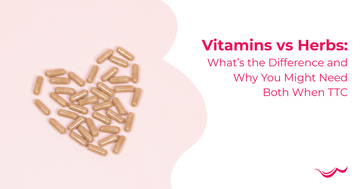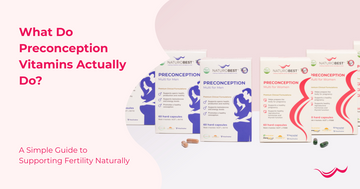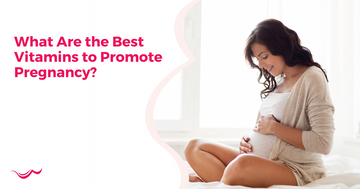Age and Fertility: Navigating the Preconception Journey in Your 20s, 30s and 40s Q & A with Corinne Leach, The Gentle Naturopath
by Nikki Warren on Jan 25, 2024

For the male partners, while sperm quality is definitely affected by age and individual state of health, sperm health is generally more easily modified with consistent dietary and lifestyle changes. There is lots of research to support the use of antioxidant therapy for benefiting sperm health!
For us females, as we age so do our eggs (also called oocytes) and our ovaries. Our total egg count also declines naturally over our lifespan and will vary depending on our health. As at the time of this blog, our AMH (Anti-Mullerian Hormone) result is the best indicator of egg reserve. In our 20’s, our egg quality and reproductive health is considered the most optimal, and for this reason some women opt to freeze their eggs for future use. For most women in their 20’s, it will be easier to conceive.
In our 30’s, the risk of miscarriage is higher, and this unfortunately does increase with age. This is mostly to do with potential genetic abnormalities, and ‘ageing’ eggs. After age 35, the increase of genetic complications in our future baby does increase significantly.
For women in their 40’s, your periods may have changed, they may not be as frequent and your egg supply or AMH is lower. A pregnancy over 35 is considered a ‘geriatric pregnancy’ in the medical world, and as a woman of 37 I do think it’s an unnecessary, loaded term! While we know that pregnancy over 35 does come with increased risks, I believe it does depend on the individual woman and her state of health. Keeping yourself well in your 20’s and 30’s and entering pregnancy in your best possible state of health helps to prevent pregnancy complications.
As a fertility naturopath, what preconception advice do you give men and women? Does your advice change with age?
For both female and male partners preparing for pregnancy I recommend at least 3 to 4 months of pre-pregnancy planning if you’re aged 20 to 30, and at least 6 months if you are over 35.
My general preconception advice includes:
- Limiting environmental toxin exposure, the key one here being EDCs (or endocrine disrupting chemicals). EDCs interfere with our hormone health and balance, and add to our body's toxic load. The big ones are plastics, phthalates and pesticides (While it’s unrealistic to aim for zero chemicals in your life, do the very best you can!)
- Both partners should take a preconception vitamin for at least three months before actively trying to conceive, to ensure there is a good baseline of nutrients available. The key nutrients supported by research are folate and iodine. Other nutrients like zinc and choline are also required for fertility and pregnancy.
- Nutrition wise, a Mediterranean-style dietary pattern is the most researched ‘fertility diet’, and is a great starting point for both partners. Incorporating lots of plant based foods, omega-3 rich seafood, wholegrains, extra virgin olive oil and antioxidant rich fruits all have an anti-inflammatory effect. Crowd out the added sugars, refined carbohydrates and trans-fats (like margarine and deep fried foods) with all of the above, and you are ticking a lot of boxes. Also avoiding alcohol and recreational drugs for both partners, and for female partners, consuming under 200mg of caffeine daily.
- Increase movement in whatever form brings you joy, and is an activity you can be consistent with. This might be walking, swimming, a group fitness class, yoga or pilates. Even better if the exercise you choose is outside in the fresh air of nature!
Ideally, both partners will be on board with the above changes, so you can enter pregnancy in optimal health, with the support of your partner.
What obstacles/challenges do you see in people trying to conceive? How does it differ between different ages?
Most of my current clients are women with endometriosis, and at least half of them are trying to get pregnant with the help of IVF. If you have endo, know that your egg quality may be compromised, and due to adhesions or an altered uterine microbiome you may also have issues with your embryo implanting/sticking, whether through natural conception or with IVF. Naturally it may take you longer to conceive.
The older we get, our egg quality and reserve decreases. If you’re going through fertility struggles, no matter your age, know that you require support, and that you don’t need to suffer in silence.
There is hope and support available, and your path to pregnancy may be different to how you dreamed it would be. In my virtual practice I work collaboratively alongside clients' IVF regime when appropriate, to help optimise their success.
What tips do you give to women and men that are older and are concerned about their fertility?
For anyone approaching or over the age of 35, I suggest working on optimising both egg and sperm quality for at least 6 months before trying to conceive.
I also recommend seeking the advice of a practitioner sooner rather than later (don’t wait 12 months before seeking help!). Order a comprehensive preconception blood test workup for both partners, including semen analysis for the male partner, so you are aware of you and your partner's individual needs early on in the piece.
That way we have time to correct nutrient deficiencies and make necessary diet and lifestyle changes, to get you feeling your best, prior to pregnancy occurring.
Ultimately we want to improve your health, so that we can pass on the best possible genes to your future offspring.
Meet the author:
Hi, I’m Corinne Leach and I’m a degree qualified Naturopath, Nutritionist and mum to 6-year-old twin girls. I’m passionate about evidence-based fertility and preconception care, to support you in growing a healthy family.
My clinic The Gentle Naturopath, is 100% virtual, which means I have the pleasure of supporting women and couples Australia-wide with preconception care, fertility struggles and IVF support. I offer free 15-minute intro calls for all new clients, and a high-touch 12-week program called Conceive with Confidence for women and couples.
- boost fertility,
- boost sperm count,
- boost sperm motility,
- boosting fertility,
- Category_Fertility/Preconception,
- conception,
- conscious conception,
- eating organic,
- female fertility,
- fertility,
- fertility diet,
- fertility foods,
- fertility naturopath,
- fertility vitamins for men,
- getting pregnant,
- having a baby,
- improving sperm health,
- infertility,
- male fertility,
- male infertility,
- natural fertility,
- sperm,
- sperm health,
- sperm quality




